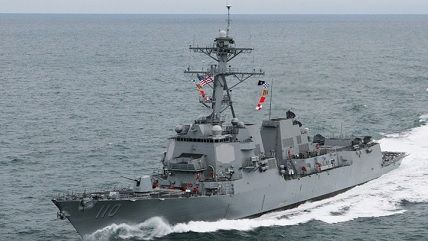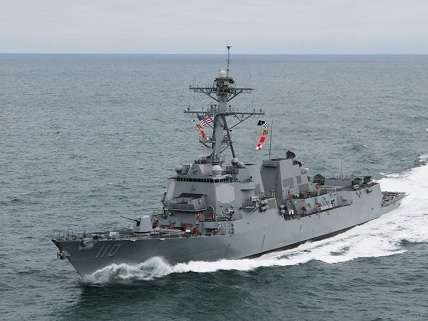U.S. Sends Destroyer Past Disputed South China Sea Islands to Challenge Countries That Make Claims
World policing.


The United States sent a destroyer to within 12 nautical miles (the limit of internationally-recognized maritime boundaries) of the disputed Spratly Islands in the South China Sea in a show intended to challenge the countries laying claim on the largely uninhabited (but militarily occupied) archipelago.
"USS William P. Lawrence exercised the right of innocent passage while transiting inside 12 nautical miles of Fiery Cross Reef, a high-tide feature that is occupied by China, but also claimed by the Philippines, Taiwan, and Vietnam," a Defense Department statement insisted, according to CNN.
"This operation challenged attempts by China, Taiwan, and Vietnam to restrict navigation rights around the features they claim … contrary to international law," the Defense Department said. "This operation demonstrates, as President Obama has stated, that the United States will fly, sail, and operate wherever international law allows. That is true in the South China Sea as in other places around the globe."
The United States, notably, does not make any claims on the Spratly Islands, which sit thousands of miles from U.S. shores and more than 1,500 miles from Guam. Vietnam, the Philippines, and Malaysia all claim sovereignty over the Spratly Islands and are closer to them than China. Taiwan also claims the Spratly Islands, which are one of a number of disputes between the various countries over sovereignty in the South China Sea. China and Japan also have territorial disputes in the East China Sea.
The United States' aggressive stance around territorial disputes in which its allies are involved are part of President Obama's "Asia pivot," an attempt to contain China militarily. The Obama administration has expressed confusion over why China's foreign policy has become more confrontational as a result of the "pivot." To crib an old Ron Paul bit, what if China sent a ship to pass within a few miles of, say, Machias Seal Island, an island over which the U.S. and Canada both claim sovereignty. Would it make a difference if Canada had warmed up to China first?
Aside from the obvious recklessness involved in deciding to be a world's policeman by "challenging" the sovereignty of other countries, U.S. involvement around the territorial disputes of its allies in places like the South China Sea make regional cooperation more difficult to attain. When the U.S. flexes its muscles on behalf of an ally's disputes it provides a subsidy—bearing the costs of a foreign policy posture on behalf of the ally—that distorts the cost-benefit analysis of the ally's broader foreign policy while desensitizing it to the costs and consequences of intransigence. Who do the islands in the South China Sea belong? U.S. policymakers don't need an answer—it's not America's business.
